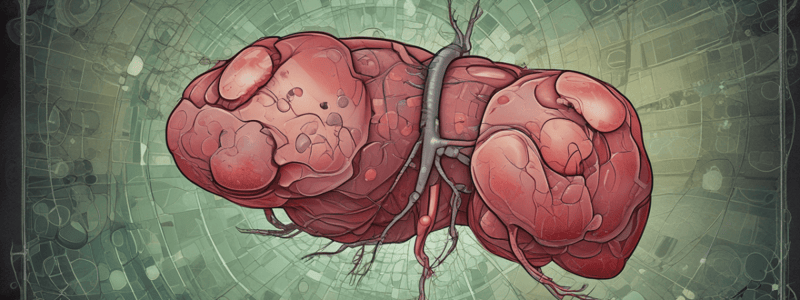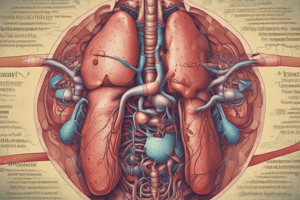Podcast
Questions and Answers
What is a potential consequence of enlarged small veins in end stage liver disease?
What is a potential consequence of enlarged small veins in end stage liver disease?
- Improved concentration
- Bleeding (correct)
- Improvement in brain function
- Enhanced kidney function
What is a symptom of Hepatic Encephalopathy (HE)?
What is a symptom of Hepatic Encephalopathy (HE)?
- Trouble sleeping at night (correct)
- Increased alertness
- Improved sleep quality
- Enhanced motor movements
What is a potential complication of ESend stage liver disease?
What is a potential complication of ESend stage liver disease?
- Enhanced coagulation
- Hepatorenal syndrome (HRS) (correct)
- Improved kidney function
- Reduced bleeding risk
What is a common method of managing ascites in end stage liver disease?
What is a common method of managing ascites in end stage liver disease?
What is the term used to describe advanced liver disease, liver failure, and decompensated cirrhosis?
What is the term used to describe advanced liver disease, liver failure, and decompensated cirrhosis?
What is a symptom of Hepatic Encephalopathy (HE)?
What is a symptom of Hepatic Encephalopathy (HE)?
What is the only cure for End-stage Liver Disease (ESLD)?
What is the only cure for End-stage Liver Disease (ESLD)?
What is a potential complication of ESLD?
What is a potential complication of ESLD?
Which of the following is an uncommon physical symptom ofend stage liver disease??
Which of the following is an uncommon physical symptom ofend stage liver disease??
What is an alternative method for managing pain in end stage liver disease?
What is an alternative method for managing pain in end stage liver disease?
What is the term for the yellowing of the skin and eyes due to the buildup of bile?
What is the term for the yellowing of the skin and eyes due to the buildup of bile?
What is the complication of end stage liver disease characterized by the swelling of the abdomen due to fluid build-up?
What is the complication of end stage liver disease characterized by the swelling of the abdomen due to fluid build-up?
What is a potential complication of end stage liver disease?
What is a potential complication of end stage liver disease?
What is the infection of the fluid from ascites that can cause fever, abdominal pain, and low blood pressure?
What is the infection of the fluid from ascites that can cause fever, abdominal pain, and low blood pressure?
What is the result of impaired blood flow through the liver in end stage liver disease?
What is the result of impaired blood flow through the liver in end stage liver disease?
Why may a patient with end stage liver disease not eligible to receive a liver transplantation?
Why may a patient with end stage liver disease not eligible to receive a liver transplantation?
What is the primary purpose of using laxatives in treating hepatic encephalopathy?
What is the primary purpose of using laxatives in treating hepatic encephalopathy?
Which organization offers palliative services in Quebec and provides an assessment form?
Which organization offers palliative services in Quebec and provides an assessment form?
What is the medication commonly used to treat itchiness in patients with ESLD?
What is the medication commonly used to treat itchiness in patients with ESLD?
What is a key factor in predicting life expectancy for someone with end stage liver disease?
What is a key factor in predicting life expectancy for someone with end stage liver disease?
What is the average life expectancy for someone with advanced stage cirrhosis?
What is the average life expectancy for someone with advanced stage cirrhosis?
What is a common symptom associated with worsening disease and shorter life expectancy in ESLD?
What is a common symptom associated with worsening disease and shorter life expectancy in ESLD?
What is the name of the health region that offers Palliative services in Saskatchewan?
What is the name of the health region that offers Palliative services in Saskatchewan?
What is the purpose of the Advance Care Planning Group?
What is the purpose of the Advance Care Planning Group?
What is the final stage of liver disease, often resulting from chronic liver damage or cirrhosis?
What is the final stage of liver disease, often resulting from chronic liver damage or cirrhosis?
What is the term for the increased blood pressure in the portal vein, causing splenomegaly, esophageal varices, and ascites?
What is the term for the increased blood pressure in the portal vein, causing splenomegaly, esophageal varices, and ascites?
What is the result of impaired ammonia detoxification and increased inflammation in liver disease?
What is the result of impaired ammonia detoxification and increased inflammation in liver disease?
What is the term for the alteration of the gut microbiome, leading to increased toxins and inflammation in liver disease?
What is the term for the alteration of the gut microbiome, leading to increased toxins and inflammation in liver disease?
What is the functional renal failure due to splanchnic vasodilation and decreased cardiac output in liver disease?
What is the functional renal failure due to splanchnic vasodilation and decreased cardiac output in liver disease?
What is the increased leakage of toxins and bacteria from the gut into the bloodstream, exacerbating liver damage in liver disease?
What is the increased leakage of toxins and bacteria from the gut into the bloodstream, exacerbating liver damage in liver disease?
What is the imbalance of pro-inflammatory and anti-inflammatory cytokines, leading to further liver damage in liver disease?
What is the imbalance of pro-inflammatory and anti-inflammatory cytokines, leading to further liver damage in liver disease?
What is the stage of liver disease characterized by decreased liver cell mass and function, leading to impaired detoxification, protein synthesis, and metabolism?
What is the stage of liver disease characterized by decreased liver cell mass and function, leading to impaired detoxification, protein synthesis, and metabolism?
Flashcards are hidden until you start studying
Study Notes
End-Stage Liver Disease (ESLD)
- ESLD is a term used to describe advanced liver disease, liver failure, and decompensated cirrhosis.
- ESLD develops after an inflammation of the liver, leading to fibrosis (scarring) and loss of regular liver function.
- The only cure for ESLD is liver transplantation, but many patients may not receive a transplant due to wait times or other health issues.
Symptoms of ESLD
- Common physical symptoms include:
- Abdominal pain
- Fatigue
- Confusion
- Pruritis (itchiness)
- Jaundice – a yellowing of the skin and eyes due to the buildup of bile
- Muscle cramps
- Edema (swelling) in the legs
- Dyspnea - shortness of breath
- Nausea and vomiting
- Constipation
- Diarrhea
- Malnutrition
Complications of ESLD
- Complications of ESLD are related to portal hypertension or increased difficulty of blood flow through the liver.
- Specific complications include:
- Ascites - swelling of the abdomen due to fluid buildup
- Spontaneous bacterial peritonitis - infection of the fluid from ascites
- Esophageal and gastric varices - blood flow through the liver is impaired, resulting in blood flow being rerouted around the liver into small veins in the passageway between the throat, stomach, and abdomen.
- Hepatic encephalopathy (HE) - deterioration of brain function, which can cause:
- Trouble sleeping at night
- Difficulty thinking clearly
- Disorientation
- Poor concentration or shortened attention span
- Mild to severe confusion
- Forgetfulness
- Shortened attention span
- Poor judgement
- Personality or mood changes
- Slow reaction time
- Anxiety
- Depression
- Worsening of handwriting or fine motor movements
- Unusual movements (shaking of hands or arms)
- Slurred speech
- Slowed movement
- Decreased alertness and responsiveness
- Hepatorenal syndrome (HRS) - impaired kidney function
- Coagulopathy – prolonged bleeding
- Spontaneous bruising
- Bleeding inside the stomach or intestine
- Bloating
Managing Symptoms of ESLD
- Pain management:
- Medications may be used
- Alternative methods include acupuncture and mindfulness
- Ascites management:
- Low-salt diet and oral diuretics (medication to help remove fluids from the body)
- More invasive options may be considered if treatments begin to lose effect
- Hepatic encephalopathy management:
- Laxatives and antibiotics are used to help preserve brain function
- Itchiness management:
- Medication called cholestyramine is used to help with itchiness
- Malnutrition management:
- Ensuring sufficient calorie intake, especially protein, and vitamin replacement is recommended
Life Expectancy with ESLD
- Life expectancy is hard to predict due to many factors, including the degree of liver disease or complications and the presence of other diseases.
- Certain symptoms are associated with worsening disease and shorter life expectancy, such as:
- Ascites that does not respond to treatment
- Kidney failure
- Bleeding from the gastrointestinal tract
- The Model for End-Stage Liver Disease (MELD) score is used to predict long-term outcomes for ESLD and prioritize patients waiting for a liver transplant.
Advance Care Planning (ACP)
- ACP is a process of thinking about and sharing wishes for future health and personal care.
- It can help prepare everyone when a person becomes ill and unable to communicate.
- Palliative care programs are available to support individuals with ESLD.
Definition and Stages
- End-stage liver disease (ESLD) is a condition where the liver can no longer perform its essential functions, leading to multi-organ failure.
- ESLD is the final stage of liver disease, often resulting from chronic liver damage or cirrhosis.
- The stages of liver disease progression are: inflammation and fibrosis, cirrhosis, decompensated cirrhosis, and end-stage liver disease (ESLD).
Pathophysiological Changes
- Hepatocellular dysfunction reduces liver cell mass and function, impairing detoxification, protein synthesis, and metabolism.
- Portal hypertension increases blood pressure in the portal vein, causing splenomegaly, esophageal varices, and ascites.
- Splanchnic vasodilation decreases vascular resistance in the splanchnic circulation, leading to increased blood flow and portal hypertension.
- Systemic vasoconstriction increases vascular resistance in the systemic circulation, leading to decreased cardiac output and peripheral hypoperfusion.
Complications
- Ascites involves the accumulation of fluid in the peritoneal cavity, leading to abdominal distension and discomfort.
- Spontaneous bacterial peritonitis (SBP) is an infection of ascitic fluid, leading to sepsis and mortality.
- Hepatorenal syndrome (HRS) is a functional renal failure due to splanchnic vasodilation and decreased cardiac output.
- Hepatic encephalopathy (HE) is a neurological dysfunction due to impaired ammonia detoxification and increased inflammation.
Gut-Liver Axis
- Dysbiosis alters the gut microbiome, leading to increased toxins and inflammation.
- Increased intestinal permeability leads to leakage of toxins and bacteria from the gut into the bloodstream, exacerbating liver damage.
- Cytokine imbalance increases pro-inflammatory cytokines and decreases anti-inflammatory cytokines, leading to further liver damage.
Consequences
- Mortality rates increase with ESLD disease progression.
- ESLD significantly impairs quality of life, with symptoms including fatigue, jaundice, and abdominal pain.
- Liver transplantation is the only curative treatment option for ESLD, but is limited by organ availability and surgical risks.
Studying That Suits You
Use AI to generate personalized quizzes and flashcards to suit your learning preferences.




